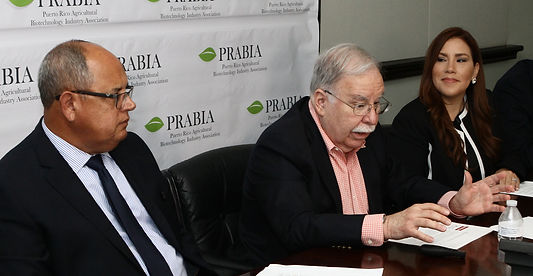-
Report reveals the socioeconomic impact of Puerto Rico’s industrial activities
-
Each dollar invested in the industry amounts to $5.36 for the local economy
SAN JUAN, Puerto Rico – The agricultural biotechnology industry in Puerto Rico deals with much more than seed farming. It is also an important source of employment and an economic activity that makes significant contributions to the island’s development. These findings and more are showcased in the first study on the economic impact of the agricultural biotechnology industry, recently conducted by Estudios Técnicos, Inc., the main firm on planning, economic assessment and market strategies in Puerto Rico.
José J. Villamil, chief executive of Estudios Técnicos, Inc., stressed that the agricultural biotechnology industry “… has important economic benefits for the country, particularly for the south of the island. In view of the economic situation in which Puerto Rico encounters, activities such as the ones represented by PRABIA assume greater importance, not only because of the economic impacts but also because of the projection of Puerto Rico as a jurisdiction with the capacity to host technologically sophisticated activities. “
Villamil remarked that the enterprise’s activities contribute to furthering knowledge in the endeavors of academic through various research and development collaborations undertaken with public and private universities. PRABIA-member companies provide study opportunities, professional practices, educational tours, and jobs to more than 700 students, aside from being the main employer of agronomists on the island, hiring 200 each year.
Among the report’s key findings, which files data from 2016, the companies that make up part of the biotechnical agricultural industry in Puerto Rico generate – for each invested dollar in the industry through incentives and tax credits – a return on investment of $5.36 for the local economy, with a net benefit of $65 million.
Also, they contribute $80 million annually to the local economy, incur in nearly $130 million in expenses on the island, pay around $5.0 million in Sales & Use Taxes, and in regard to induced, direct or indirect jobs, the industry helps generate $82.5 million in salaries.
“The report, conducted in an independent and transparent fashion, restates the importance of this sector for Puerto Rico and for the world. Aside from propelling the country’s development through the economic activity and the employment it generates, the industry also plays a vital role in the communities in which we work. Agricultural biotechnology is more than seeds; it is an instrument toward the creation of a better life quality,” said Beatriz Carrión, executive director of the Puerto Rico Agricultural Biotechnology Industry Association (PRABIA), the entity that groups and represents the seven agricultural biotechnology enterprises that operate in Puerto Rico.
Carrión also highlighted the international leadership role undertaken by the companies that make up PRABIA. Currently, over 85% of the seeds used worldwide for biotechnological-based agriculture passes through Puerto Rico during its development.
According to the report, PRABIA-member companies jointly rent nearly 5,000 acres of land at a cost lower than the average normally paid ($547 per acre vs. the average cost of $258), for a total of $3.0 million or sopaid in rent each year. This, added to the nearly $40 million already invested in the purchase of land, amounts to multiple benefits for the landowners in question. The land dedicated to agricultural biotechnology on the island represents only 1.5% of land set aside for agriculture in Puerto Rico.
Other alliances in this area include collaborations with the University of Puerto Rico, Mayagüez campus, the Pontifical Catholic University of Puerto Rico, the College of Agronomists, ARA (Agricultural Action and Reform, in Spanish), and the Puerto Rico Association of Farmers, among others.
Also, until recently, PRABIA-member companies have contributed over $2.0 million in humanitarian efforts in the wake of hurricanes Irma and María. This, combined with various workshops and community programs, positively impacts over 124,600 people.
The “Economic Impact of the Agricultural Biotechnology Sector” study will be available soon on PRABIA’s website. Please visit www.prabia.com
###
About PRABIA
Founded in 1995, PRABIA is a nonprofit organization that gathers the main agricultural biotechnology companies that operate in Puerto Rico – AgReliant Genetics, Bayer, Dow AgroSciences, Syngenta, Illinois Crop Improvement, Monsanto del Caribe and DuPont Pioneer. The objective of the Association is to strengthen the agricultural biotechnology ecosystem on the Island in the face of global food production challenges. The operations of the PRABIA member companies promote economic development by creating about 5,000 direct and indirect employment opportunities, foster education, support communities, strengthen the academic community, and establish programs aimed at future scientists and agronomists.
For more information about PRABIA, visit www.prabia.comor the official Facebook page at http://bit.ly/2dva988.

